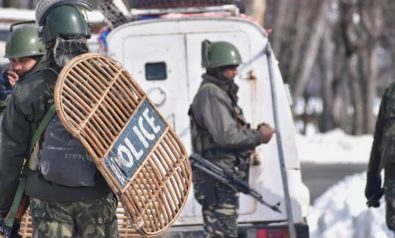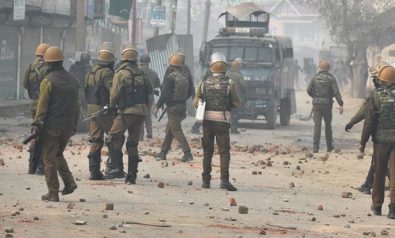Fact 1: The June 3, 1947, partition plan announced by the British government and its 1947 Indian Independence Act pertained only to the directly-administered British provinces and other territories.
Note that there were 565 princely states that covered 40% of the area of pre-independent India and 23% of its population. Remember, that pre-independent India included the three modern-day countries of India, Pakistan and Bangladesh.
Scroll down to read more on this 360° series
Fact 2: The 565 princely states had three options. They could join India, Pakistan or remain independent. The partition of the country dealt with British-administered India, not princely states.
Fact 3: Independence brought an end to princely states. Most joined India while a few joined Pakistan. The ruler of Junagadh opted for Pakistan. It was surrounded by India, and the Pakistani state of Sindh was more than 200 kilometers away. Furthermore, although the ruler of Junagadh was Muslim, its population was 90% Hindu. So, the ruler’s decision did not make sense.
Muhammad Ali Jinnah, the founder and first leader of Pakistan, accepted the accession of Junagadh. However, India annexed the territory and it is now a part of the state of Gujarat. Pakistan claims Junagadh to this day.
Fact 4: The Hindu ruler of Jammu and Kashmir wanted to remain independent. He detested Jawaharlal Nehru, India’s first prime minister, because of his socialist leanings. At the same time, the ruler disliked Jinnah for his arrogance and coldness.
Fact 5: The Muslim Conference, led by Chaudhry Ghulam Abbas, which was allied to Jinnah’s Muslim League, masterminded a revolt against the Hindu ruler of Jammu and Kashmir. This resulted in the killing of Hindus and Sikhs.
Fact 6: In revenge, the Hindu ruler’s forces carried out a much bigger massacre of Muslims.
Fact 7: On the night of October 21-22, 1947, Pakistan sent tribal militia and Pakistani soldiers dressed in civilian clothes into Kashmir. They fomented a revolt of Kashmiri Muslims against the Hindu ruler.
Sheikh Abdullah, the leader of National Conference and a close associate of Nehru, opposed the Pakistani incursion. The tribal militia forgot their purpose for entering Kashmir. They began looting, plundering and raping the local population. They even raped nuns in a Catholic monastery.
Fact 8: India only helped the Hindu ruler after he signed the Instrument of Accession on October 26-27, 1947. This was the same document that other princely states signed when they acceded to India.
Fact 9: In February 1948, Pakistan committed itself openly to war in Kashmir. From now on, it was not just tribesmen and irregulars but the Pakistani military itself that was involved. The historical record shows that the Indian military was able to stop the Pakistani advance. By May 1948, the Pakistanis were being pushed back.
At some point, Nehru decided to stop the military operation and not to advance further. On January 1, 1948, the United Nations Security Council brokered a ceasefire. Its resolution required both sides to withdraw from the princely state so that a plebiscite could be held. To this date, neither side has demonstrated any willingness to do that.
Fact 10: When examining Kashmir, it is important to look at Balochistan. Before independence, it consisted of two entities. One was the princely state of Kalat with several vassal entities. The other was British Balochistan, which had a local representative assembly named Shahi Jirga that voted in favor of joining Pakistan. In June 1946, Jinnah represented the ruler of Kalat before the cabinet mission where he strongly pleaded for the independence of the princely state. However, after Pakistan gained independence on August 14, 1947, Jinnah reversed his stand and his government put pressure on Kalat to accede to Pakistan.
By this time, Kalat had already declared itself independent on August 11, 1947. By the end of March 1948, the ruler of Kalat was browbeaten into changing his mind and Pakistani forces entered the princely state triumphantly. Several Baloch chieftains opposed Kalat’s accession, including the ruler’s brother. However, the men under Baloch chieftains were no match to the Pakistani military.
Fact 11: Sardar Vallabhbhai Patel, India’s first home minister, made an offer to Jinnah that is little known today. In return for Pakistan not encouraging the ruler of Hyderabad to join Pakistan or declaring independence, India would let Pakistan keep Kashmir. Jinnah rejected that offer.
The princely state of Hyderabad was in southern India. It was landlocked, encircled entirely by the new Indian nation-state. Although its ruler was Muslim, the majority of Hyderabad’s population was Hindu. Therefore, Jinnah’s rejection of Patel’s offer was not exactly wise.
Fact 12: On September 13, 1948, Indian forces moved into Hyderabad and annexed the princely state. Jinnah had encouraged its ruler to declare independence. That declaration came to naught. The net result of Jinnah’s policy was that Pakistan lost both Kashmir and Hyderabad.
Fact 13: The UN resolutions on Kashmir laid down preconditions, which have never been fulfilled. In the aftermath of Pakistan’s defeat in 1971, East Pakistan became an independent country named Bangladesh.
A few months after the1971 war, India and Pakistan signed the Shimla Agreement in 1972. India agreed to release 94,000 Pakistani prisoners of war. In return, Pakistan agreed to treat Kashmir and other disputes as bilateral issues. The Shimla Agreement made the UN resolutions obsolete, superfluous and redundant.
Fact 14: On February 21, 1999, India and Pakistan signed the Lahore Accord. Like the Shimla Agreement, this accord declared that Kashmir and other disputes were bilateral issues.
Fact 15: In 2009, UN Secretary-General Kofi Annan announced that the resolutions on Kashmir fell under chapter six, not chapter seven of the United Nations charter. In a resolution that falls under chapter six, both parties to a dispute have to agree to UN intervention. Furthermore, either party can reject intervention without incurring any punitive action.
The upshot of Annan’s announcement is that the UN Security Council has no obligation to enforce the 1948 resolutions. India and Pakistan can voluntarily abide by them or ignore them.
The views expressed in this article are the author’s own and do not necessarily reflect Fair Observer’s editorial policy.
Support Fair Observer
We rely on your support for our independence, diversity and quality.
For more than 10 years, Fair Observer has been free, fair and independent. No billionaire owns us, no advertisers control us. We are a reader-supported nonprofit. Unlike many other publications, we keep our content free for readers regardless of where they live or whether they can afford to pay. We have no paywalls and no ads.
In the post-truth era of fake news, echo chambers and filter bubbles, we publish a plurality of perspectives from around the world. Anyone can publish with us, but everyone goes through a rigorous editorial process. So, you get fact-checked, well-reasoned content instead of noise.
We publish 2,500+ voices from 90+ countries. We also conduct education and training programs
on subjects ranging from digital media and journalism to writing and critical thinking. This
doesn’t come cheap. Servers, editors, trainers and web developers cost
money.
Please consider supporting us on a regular basis as a recurring donor or a
sustaining member.
Will you support FO’s journalism?
We rely on your support for our independence, diversity and quality.










